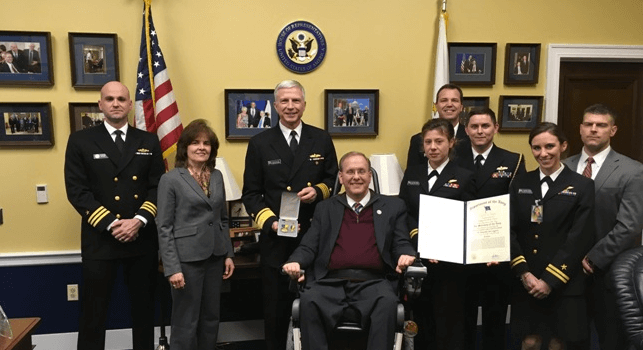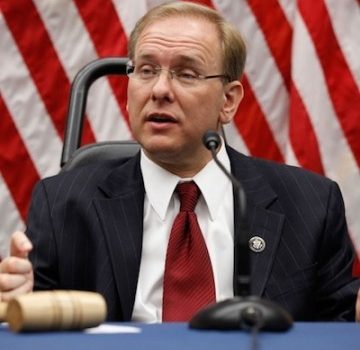By MICHAEL D. SHEAR
WEST PALM BEACH, Fla. — President-elect Donald J. Trump has named Thomas P. Bossert, a top national security aide under President George W. Bush, to be his homeland security adviser, the Trump transition team announced Tuesday morning.
Mr. Bossert will become assistant to the president for homeland security and counterterrorism, a position the transition team said would be equal in status to that of Lt. Gen. Michael T. Flynn, whom Mr. Trump has chosen to be his national security adviser. The same position under President Obama has been a deputy national security adviser.
The change in rank “reflects the unwavering commitment President-elect Trump has to the safety and security of the nation, its people and territory,” the transition team said in a statement.
“Mr. Bossert will focus on domestic and transnational security priorities as General Michael Flynn remains steadfastly focused on international security challenges,” it said.
Officials on Mr. Obama’s national security team challenged the assertion that Mr. Bossert had been elevated to a higher position than his counterpart in the current administration, Lisa Monaco, who also has the title assistant to the president.
A senior national security official, who spoke on the condition of anonymity to discuss personnel matters relating to the incoming administration, noted that Ms. Monaco was the chairwoman of the Principals Committee of the Homeland Security Council, had a seat on the National Security Council and participated alongside the national security adviser during daily national security briefings for Mr. Obama.
The new designation for Mr. Bossert may suggest a desire by the new administration to reconfigure the national security apparatus at the White House.
Before Mr. Obama, the homeland security adviser oversaw a staff that was separate from the one run by the national security adviser. Mr. Obama combined those into a single, unified staff when he came into office. Mr. Trump may be thinking about splitting them again.
In the statement, Mr. Trump called Mr. Bossert “an invaluable asset” and praised the breadth of experience he would bring to the new administration. “He has a handle on the complexity of homeland security, counterterrorism and cybersecurity challenges,” Mr. Trump said.
Mr. Bossert served as deputy homeland security adviser for Mr. Bush, and he runs a risk management consulting firm in Washington. He is also a senior fellow at the Atlantic Council, working on the research institution’s Cyber Statecraft Initiative.
Helping to protect the country from cybercrimes is likely to be a major focus for Mr. Bossert in light of the hacking of the Democratic National Committee and other incidents in recent years. Mr. Bossert will face the challenge of balancing cybersecurity needs against the privacy concerns of internet companies.
“We must work toward cyber doctrine that reflects the wisdom of free markets, private competition and the important but limited role of government in establishing and enforcing the rule of law, honoring the rights of personal property, the benefits of free and fair trade, and the fundamental principles of liberty,” Mr. Bossert said in the statement announcing his appointment.
News of Mr. Bossert’s selection drew praise from some members of Congress and former colleagues in the Bush administration, who described him as capable and knowledgeable about threats to the country.
Representative Jim Langevin, Democrat of Rhode Island, also praised the choice. Mr. Langevin, a founder of the Congressional Cybersecurity Caucus, said Mr. Bossert had approached the issues of cyberthreats in a “centrist, bipartisan” manner.
“I also hope that he will impress upon the president-elect the vital national security concerns tied to Russian information warfare activities, and I encourage him to work closely with Congress in attempting to build our resilience and our defenses to forestall such operations in the future,” Mr. Langevin said in a statement.
Frances F. Townsend, who was Mr. Bush’s homeland security adviser, said she was confident that Mr. Bossert would “continue to demonstrate the capacity and insight needed to take on the tough challenges facing the country.”
She focused in particular on Mr. Bossert’s expertise in another key part of the job: responding to natural disasters and other crises that require coordination among the White House, governors and other state officials.
In a brief text message, Ms. Townsend called Mr. Bossert a “great pick” and recalled that he had helped lead the “after-action review” after Hurricane Katrina in 2005, helping to create more than 100 recommendations about how to better respond to such crises. “Tom knows the importance of public-private partnerships and most importantly how best to establish and strengthen them,” she said.
Also on Tuesday, the transition team formally announced that Jason D. Greenblatt, the chief legal officer of the Trump Organization and a longtime adviser to Mr. Trump, would serve as his special representative for international negotiations. Mr. Greenblatt has been the president-elect’s business attorney for years, and in a statement, Mr. Trump called him “one of my closest and most trusted advisers.”
“He has a history of negotiating substantial, complex transactions on my behalf, as well as the expertise to bring parties together and build consensus on difficult and sensitive topics,” Mr. Trump said.
As the president’s special representative, Mr. Greenblatt is likely to focus on peace between the Israelis and the Palestinians, renegotiating trade agreements and the relationship between the United States and Cuba, among other international issues.













